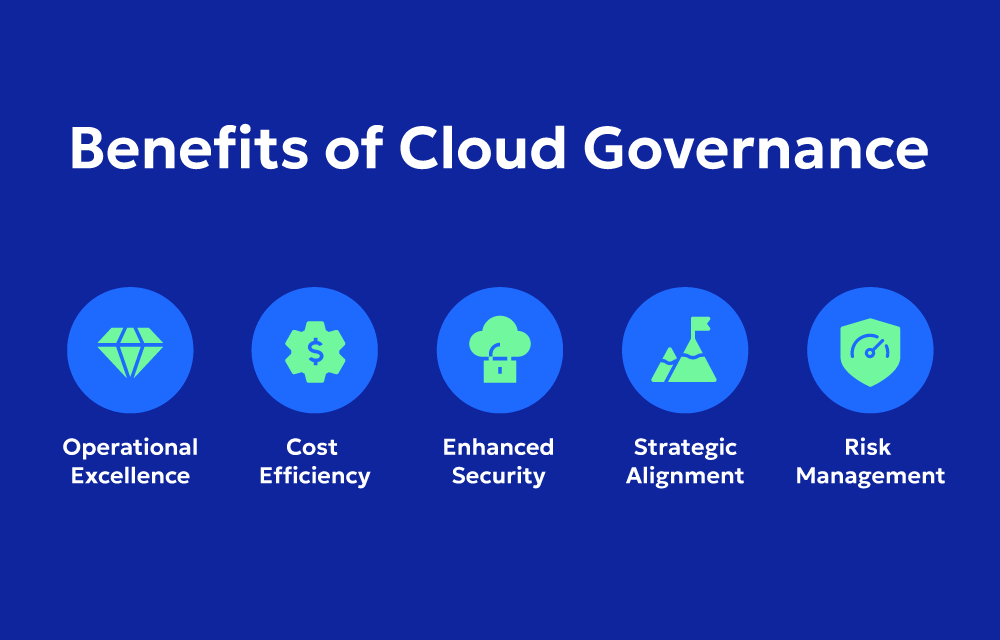What is Cloud Governance?
Cloud governance involves establishing rules, processes, and controls to manage cloud computing services. This framework ensures that cloud resources are used efficiently, securely, and in compliance with organizational policies and regulatory requirements. It encompasses policies, technologies, and best practices that align cloud operations with business goals.
Why is Cloud Governance Important?
- Cost Management: Cloud governance helps monitor and control cloud spending through budgeting, cost tracking, and usage optimization.
- Security and Compliance: It ensures that security protocols are followed, reducing the risk of data breaches, and it helps maintain regulatory compliance.
- Resource Optimization: It provides mechanisms to allocate cloud resources efficiently to avoid underutilization or overprovisioning.
- Operational Efficiency: Streamlined governance leads to efficient processes, better collaboration, and reduced operational delays.
Challenges
- Policy Enforcement: Ensuring that cloud policies are consistently followed across diverse teams can be challenging.
- Complexity of Multi-Cloud Environments: Managing and governing multiple cloud platforms adds complexity to tracking, monitoring, and securing resources.
- Rapid Cloud Adoption: The increasing pace of cloud adoption can lead to gaps in governance frameworks.
- Balancing Innovation and Control: Finding the right balance between enabling innovation and maintaining strict control over cloud resources is often difficult.
5 Disciplines of Cloud Governance
- Cost Management: Establishing budgets, tracking spending, and optimizing cloud usage to maximize the ROI.
- Security Baseline: Implementing policies and controls to ensure data and applications in the cloud are secure.
- Resource Consistency: Defining and enforcing standards for resource deployment and configuration to ensure consistency.
- Identity and Access Management: Setting up proper user roles and permissions to control access to cloud resources.
- Monitoring and Reporting: Continuously monitoring the cloud environment for anomalies and generating reports to ensure compliance and optimize performance.
Business Case: Cloud Governance at Neptune Healthcare
Neptune Healthcare, a provider of digital health solutions in the United States, struggled with escalating cloud costs and regulatory compliance in their rapidly expanding cloud infrastructure. Therefore they established a cloud governance framework focusing on the five key disciplines:
- Cost Management: They used cost management tools to track spending, implemented reserved instances for predictable workloads, and optimized their usage patterns, reducing operational costs.
- Security Baseline: They enforced strict security policies, encrypting data at rest and in transit, requiring multi-factor authentication, and regularly conducting security audits to comply with HIPAA and other regulations.
- Resource Consistency: Neptune used cloud templates and configuration tools to standardize deployments, ensuring compliance and reducing risks of configuration errors.
- Identity and Access Management: A centralized identity management system was used to control access, providing specific roles for IT and healthcare staff to prevent unauthorized data access.
- Monitoring and Reporting: They set up real-time monitoring to alert on unusual activity and streamline compliance reporting for continuous regulatory adherence.
Results
This governance framework led to a 30% reduction in cloud costs within a year, improved compliance with healthcare regulations, and strengthened security, establishing Neptune Healthcare as a governance leader in the healthcare industry.
Cloud governance is crucial for any organization aiming to optimize cloud spending, enhance security, and ensure compliance. By following a framework that includes cost management, security, resource consistency, identity access management, and monitoring, organizations can manage their cloud infrastructure successfully.




